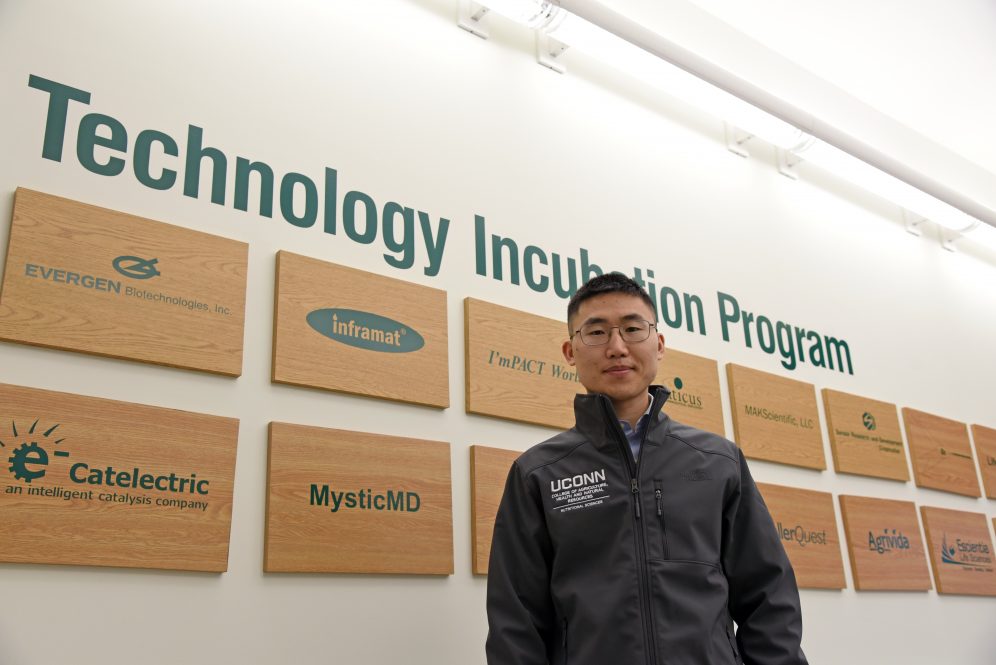Mingyu Qiao’s career in food science has incorporated his interest in engineering and entrepreneurship into investigating the use of food-based compounds to create safer foods.
Qiao joins the Department of Nutritional Sciences in the College of Agriculture, Health and Natural Resources this semester as an assistant professor of innovation and entrepreneurship.
The Future is Nature
At Northwest A&F University in China, Qiao majored in food safety and quality. But he was also interested in materials science and engineering.
“Because food science is a very multidisciplinary major, I could use a lot of materials science engineering and chemistry,” Qiao says.
As an undergraduate, Qiao worked on research detecting foodborne pathogens using molecular detection methods.
As a graduate student at Auburn University, Qiao focused on how to use natural chemicals to protect food from pathogens.
Qiao worked on extracting the natural antimicrobials found in the clitocybe nude mushroom. These antimicrobial compounds could be used to wash lettuce or other produce instead of chemical disinfectants.
The molecules in the clitocybe nude are broad-based antimicrobials that kill all major food-borne pathogens, like salmonella or E. coli.
As consumers increasingly prefer natural products, especially when it comes to their food, this is a growing and important research area.
That’s the future – everything will be natural. — Mingyu Qiao
“I’ve learned the trend is that consumers don’t want synthetic chemicals, so that’s the future – everything will be natural,” Qiao says.
Further, natural chemicals are likely more effective with fewer molecules. Traditionally, produce is coated in multiple antimicrobials, fungicides, and pesticides to ensure they catch all potential pathogens. But natural chemicals can likely combat all these categories since they are much more complex.
“For natural antimicrobials, I believe, there’s a possibility you only need to use one or two extracts to accomplish that,” Qiao says.
Another advantage is that since these chemicals are naturally derived, users don’t need to disclose their use on the label, as they do with synthetic chemicals. This will allow consumers to know they are buying a cleaner product.
However, it can be difficult to extract natural molecules. Additionally, these methods are more expensive, and natural chemicals are harder to apply as widely as artificial antimicrobials. This means you may need to use more product to get the same effect, driving costs up.
During his PhD, Qiao turned to developing synthetic versions of the clitocybe nude molecules. While effective, these turned out to be less marketable since they are not a natural compound.
Now at UConn, Qiao is interested in collaborating with colleagues working with sugar kelp, like Ji-Young Lee and Young-Ki Park. Qiao says sugar kelp polymers may be able to encapsulate the small antimicrobial molecules with which he works. This would allow Qiao to design a controlled release of the antimicrobials that would use less product while still achieving maximum antimicrobial effect, making it a sustainable and affordable option.
“In that way, it will have minimal impact to the environment while it provides us a safe and nutritious product through smart engineering,” Qiao says.
Bringing Research to Market
Qiao’s advisor at Auburn University, Tung-Shi Huang, was collaborating with a chemist, S.D. Worley, who had invented a new antimicrobial compound known as N-halamine.
Qiao and Huang were the first to test the compound’s use for food safety.
“I was amazed by the efficacy,” Qiao says.
As a postdoctoral researcher at Cornell University, Qiao partnered with Minglin Ma, a chemical engineer, and continued working with N-halamine to develop a series of products that could disinfect an array of surfaces.
In 2018, Qiao founded a startup, Halomine Inc., based on this invention.
N-halamine forms a “re-chargeable” bond with chlorine. When chlorine, an established disinfectant chemical, leaves the bond to kills a pathogen on the surface to which it is applied, N-halamine holds its position by binding to a hydrogen molecule. Then, once the pathogen is killed, the chlorine molecules can return to the bond. This process extends the antimicrobial efficacy of chlorine by days or even weeks, compared to the 10-15 minutes chlorine is normally active.
Halomine has received funding from the U.S. Department of Agriculture, National Science Foundation, National Institutes of Health, and the U.S. Department of Defense to study applications of this technology for disinfecting in healthcare settings, wound dressings, food safety, and public surfaces.
Halomine has licensed its products to one of the world’s largest professional cleaning and hygiene companies.
“For a product to be successful you need to have a very broad market,” Qiao says. “That one product has many applications, so that’s a pretty good starting point for a startup.”
Innovating at UConn
Qiao will bring his expertise in translating research from the lab to the market to UConn.
Qiao is one of the recently hired faculty brought aboard as part of the Innovation Faculty Hires & Entrepreneurial Ecosystem Initiative.
“I have a good understanding of both science and technology and business,” Qiao says. “I have translated a very fundamental science into technology and into a product. I have seen it the whole way.”
In his work, Qiao is driven by the question, “How can I use my research to develop technology that can benefit people?”
The answer comes from responding to two other critical questions: “Is this commercially viable?” and “Is this really effective?”
“The biggest lesson I learned is that a lot of good research can’t be translated into a commercial product,” Qiao says. “But that doesn’t mean it isn’t good research. It’s about finding the best connection between the two.”
Qiao hopes to encourage other UConn researchers and his future graduate students and postdocs to become entrepreneurs, learning how to connect their research to the market.
“I feel like this College is much better [than many others] because there’s a lot of application already, and through UConn Extension it’s already pretty close to the market and what people want,” Qiao says. “I hope we can do something to change the course of research and incubate more startups out of UConn.”



